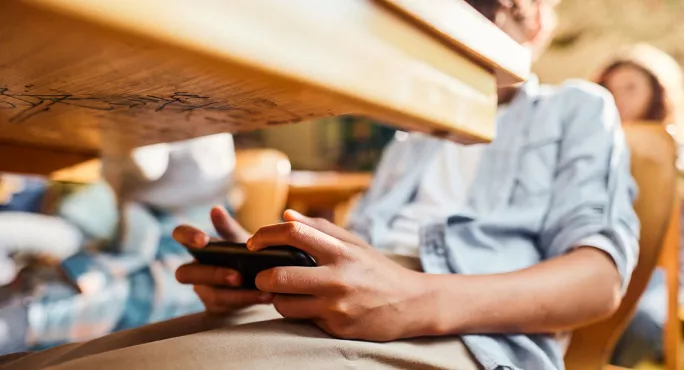Mobile ban would spark ‘secretive’ use, Gibb warned

Pupil access to mobile phones in school should be left to leaders’ discretion, union leaders have warned.
The warning comes after schools minister Nick Gibb said the government would “look very carefully” at a Unesco report that highlighted their negative impact on learning.
The report highlighted data suggesting that simply being near a mobile device can distract and have a negative impact on pupils’ learning.
Following the report, Mr Gibb said phones should be kept out of the classroom and that students should be taught to “ration” screen time at home.
In England, it is up to individual school leaders to decide their own policies on mobile phones and whether they should be banned.
Mr Gibb said: “I think headteachers should use that discretion to keep mobile phones out of the classroom. I think they can be disruptive to lessons. I worry about cyberbullying.
“But also, in the relationships and sex education guidance, we were very clear that teachers should be conveying the message to young people to ration their own use of their smartphones outside of school hours.
“Because what we can’t have are children being on their mobile phones to one in the morning and coming into school the next morning half asleep.”
- Pro-ban: Why banning mobile phones in school is a smart move
- News: Ofqual to consider use of technology in exams
- Behaviour: How to tackle low-level disruption
Geoff Barton, general secretary of the Association of School and College Leaders, said the majority of schools already have robust policies on mobile phones in place, with pupils either banned from using them during the school day or restricted to certain circumstances.
Mr Barton said: “Banning mobile phones entirely…would raise some practical concerns, for example for parents wanting to contact their children while travelling between school and home.
“Some pupils will also use phones as payment methods on public transport.”
He added: “We completely understand the legitimate concerns around the use of mobile phones, including cyberbullying, the impact of extended screen time on mental health and the lack of regulation of big technology companies.
“The fact is, though, the widespread use of smartphones is a societal issue and problems that result from this are more likely to arise outside of the school gates.”
Sarah Hannafin, head of policy at the NAHT school leaders’ union, said a complete ban on mobile phones may work for some schools, but she cautioned that it may cause more problems than it solves.
She said it may “lead to pupils becoming more secretive about their phone use, meaning problems are hidden from staff and therefore more difficult to spot and address”.
Ms Hannafin added: “Schools help to prepare young people for the outside world, and this includes equipping them with awareness and strategies to responsibly monitor their own screen use and the ability to identify and respond to any potentially harmful content and the impact it may have.
“Individual schools know their pupils and communities, so are best placed to develop their own policies when it comes to mobile phones according to what works for them and for pupils’ education and wellbeing.”
Earlier this month, the Dutch government announced that mobile phones, tablets and smartwatches will be largely banned from classrooms in the Netherlands from January next year in a bid to limit distractions during lessons.
France banned mobile phones in primary and middle schools in 2018.
When asked whether the government will reconsider its position on mobile phones in classrooms, Mr Gibb said: “We keep all these policies under review the whole time and we will look very carefully at the [Unesco] report to see whether there are lessons that we can learn.”
The UN report on technology in education said: “Extended screen time can negatively affect self-control and emotional stability, increasing anxiety and depression. Few countries have strict regulations on screen time.”
‘Little evidence’ on edtech value
The report also called on governments to base edtech procurement decisions “on reliable evidence that looks at the long-term effects of interventions, carefully considering all pedagogical elements involved”.
It added that there is “little robust evidence on digital technology’s added value in education - with the majority of evidence in favour coming from companies trying to sell it”.
The report said just 7 per cent of education technology companies had conducted randomised controlled trials in the UK, while just 12 per cent had used third-party certification.
You need a Tes subscription to read this article
Subscribe now to read this article and get other subscriber-only content:
- Unlimited access to all Tes magazine content
- Exclusive subscriber-only stories
- Award-winning email newsletters
Already a subscriber? Log in
You need a subscription to read this article
Subscribe now to read this article and get other subscriber-only content, including:
- Unlimited access to all Tes magazine content
- Exclusive subscriber-only stories
- Award-winning email newsletters



